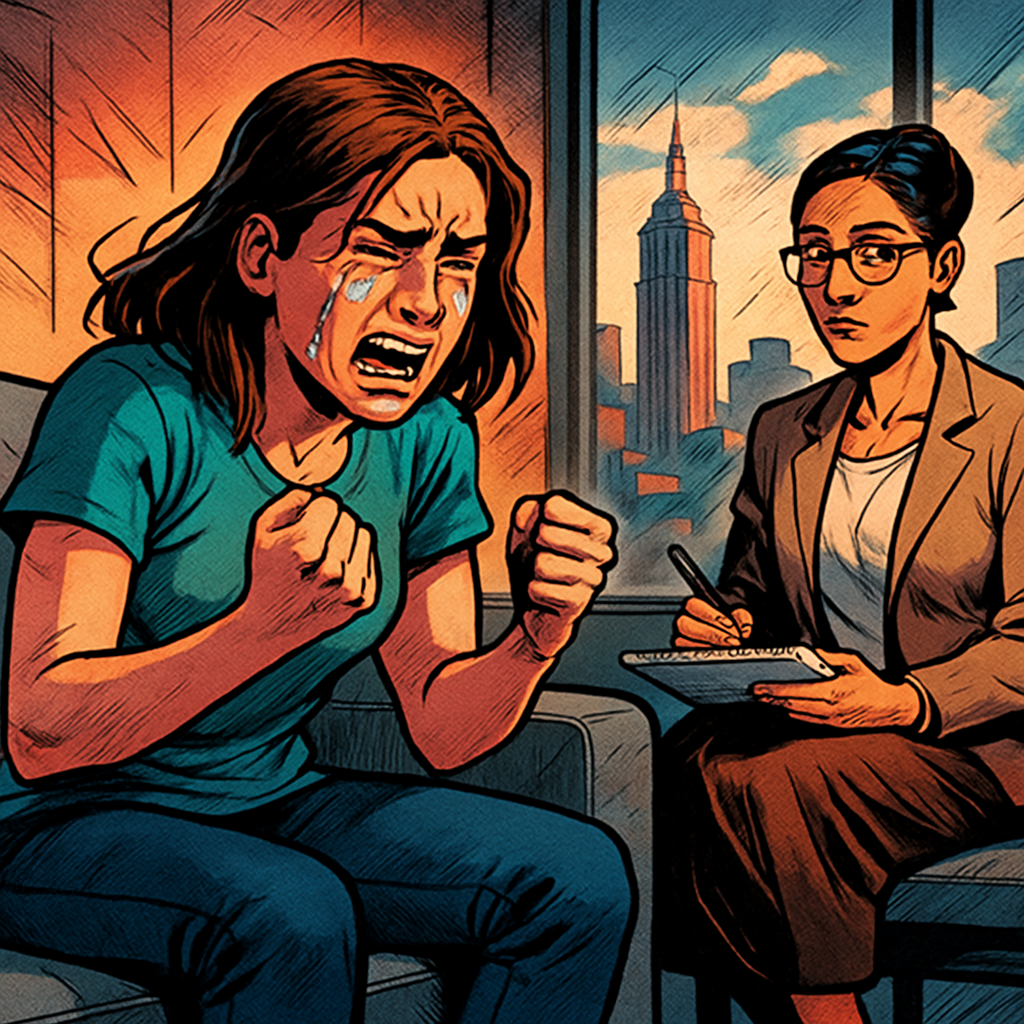It was the kind of Tuesday afternoon when Manhattan seems to blur at the edges, when one client appointment bleeds into the next, and the parade of human hearts on display becomes an impressionist painting of longing and regret. Then Avery walked in—late twenties, impeccably dressed in that “I make good money but haven’t quite figured out who I am yet” way.
Within five minutes, she was sobbing, mascara creating abstract art on her cheeks, describing her mother’s latest pregnancy announcement with the kind of raw horror usually reserved for disaster movies. 😢
“She’s having her NINTH child. NINTH! And she had the audacity to call me expecting congratulations,” she said, wadding tissues between manicured fingers. “I raised half her kids while she played house with my stepdad between their screaming matches. Now she wants me to be excited about another one?”
Some clients stay with you long after therapy ends. Avery was one of those—not because her situation was unique, but because it was so painfully common: the child who became the parent, now grown and drowning in resentment they’re not “allowed” to feel.
The Inheritance We Never Asked For 🧬
Here’s what nobody tells you about family dynamics: they’re contagious. The roles we play in our families of origin become emotional templates we carry into every other relationship. Avery didn’t just inherit her mother’s eyes and tendency to talk with her hands—she inherited a responsibility that was never hers to bear.
“I was thirteen when I started making school lunches and helping with homework,” she told me in our third session. “By sixteen, I was basically running the household while Mom was pregnant again or fighting with James or making up with James—usually by getting pregnant again.”
The bitter truth is that many adults are still parenting their parents while simultaneously trying to build their own lives. They’re carrying emotional patterns so deeply encoded with caretaking scripts that they don’t recognize where their responsibilities actually end.
These patterns don’t just disappear with distance or time—they become the invisible architecture of our adult relationships. Avery’s body physically tensed when her phone rang during our sessions. “It’s probably Mom needing something,” she’d say, the weight of anticipated demands already settling into her shoulders before she even checked the screen. 📱
The Guilt Tax on Boundaries 💸
“Am I horrible for not being happy about this baby?” Avery asked in almost every session for weeks. “Everyone keeps saying ‘all babies are blessings’ and ‘family is everything,’ but all I feel is dread and anger.”
Let’s be honest about something: we’ve created a culture that sanctifies parenthood while simultaneously providing almost no support for it. We expect women to be endlessly nurturing while denying them the resources to do so effectively. Then we gaslight anyone who points out that maybe—just maybe—having more children than you can emotionally or financially support isn’t actually a “blessing” for anyone involved.
The most insidious part? The emotional toll gets passed down to children who never consented to any of it.
When Avery finally set her first real boundary—declining to host a baby shower—the backlash was swift and brutal. Her mother cried. Her siblings called her selfish. The guilt tax on her newfound boundary was steep, precisely because it threatened a system that depended on her compliance.
Ask yourself: ⭐
- Do you apologize when setting perfectly reasonable boundaries?
- Does your stomach clench when certain family members call?
- Have you ever described yourself as “the responsible one” in your family?
- Do you feel guilty prioritizing your needs over others’ wants?
- Has “being there for family” consistently meant sacrificing your own wellbeing?
The Courage to Disappoint 💪
“I think what I’m most afraid of,” Avery confessed six months into our work together, “is that if I stop being useful to her, there won’t be anything left between us.”
This is the terrifying precipice so many find themselves standing on: realizing that what they’ve called love has actually been an elaborate system of emotional labor exchange. And the question becomes: if I’m not the fixer/caretaker/emotional support human, who am I? And will I still be loved? 💔
What Avery gradually came to understand was that her anger wasn’t just about her mother’s pregnancy—it was about a lifetime of having her emotional needs deprioritized. It was about watching the person who should have been protecting her continuously create chaos that Avery then had to manage.
Her resentment wasn’t a character flaw; it was an appropriate response to an inappropriate situation.
The day Avery told her mother she wouldn’t be available for daily childcare after the new baby arrived was the day I saw her actually breathe fully for the first time. The guilt was still there, but something else was emerging alongside it—a tentative sense of her own worth, her own right to choose the shape of her life.
“She’ll survive without me constantly rescuing her,” Avery said with something approaching wonder. “And if she doesn’t… that’s actually not my responsibility to fix.” ✨
Core Insight 🌟
Sometimes the bravest thing we do isn’t facing danger—it’s facing the disappointment of someone we’ve been programmed to please at all costs.
— Lola Adams, noting that our most destructive relationship patterns often began as brilliant childhood survival strategies we’ve outgrown but can’t seem to discard
References:
https://www.apa.org/news/press/releases/2023/11/maternal-stress-behavior-problems
https://pmc.ncbi.nlm.nih.gov/articles/PMC7863987/
https://www.sciencedaily.com/releases/2012/09/120906074021.htm
https://pmc.ncbi.nlm.nih.gov/articles/PMC10968301/
https://journals.sagepub.com/doi/full/10.1177/0030222820950891

